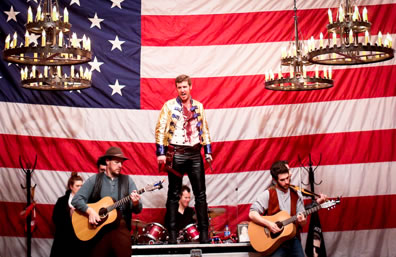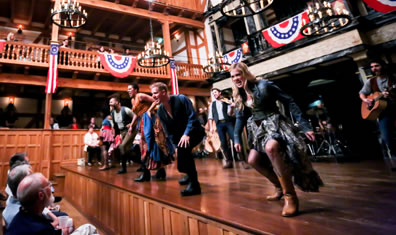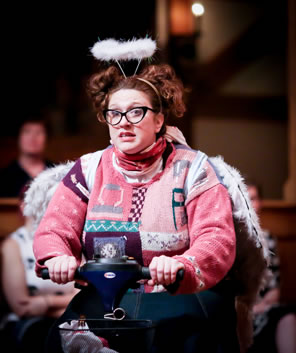Bloody Bloody Andrew Jackson
Fitting Its Place and Time
Book by Alex Timbers, music and lyrics by Michael Friedman
American Shakespeare Center, Blackfriars Playhouse, Staunton, Virginia
Friday, June 17, 2016, B–7&8 (center stalls)
Directed by Jim Warren
 A bloody Andrew Jackson (Patrick Earl) leads the band in the American Shakespeare Center's production of Bloody Bloody Andrew Jackson at the Blackfriars Playhouse (the flag is the set; the chandeliers are part of the theater's decor). Allison Glenzer is back left, the two guitarists are John Harrell (left) and Zack Powell, the drummer is Chris Johnston. Photo by Lindsey Walters, American Shakespeare Center.
A bloody Andrew Jackson (Patrick Earl) leads the band in the American Shakespeare Center's production of Bloody Bloody Andrew Jackson at the Blackfriars Playhouse (the flag is the set; the chandeliers are part of the theater's decor). Allison Glenzer is back left, the two guitarists are John Harrell (left) and Zack Powell, the drummer is Chris Johnston. Photo by Lindsey Walters, American Shakespeare Center.Warning! This review is for mature audiences only. I don't care what age you may be, going forward you need social, psychological, emotional, and, most acutely, political tolerance. Because for all the advance warnings from posters, ushers, and preshow speeches at the Blackfriars Playhouse in Staunton, Virginia, about Bloody Bloody Andrew Jackson's violent content, sexual references, excessive eyeliner, and ab-so-friggin'-lute-ly filthy language, it's the political undertones of this musical that will just as likely drive some audiences to the exit—moments such as the red farmer's caps Jackson and his entourage wear emblazoned with "Make America Hard Again."
Undertones? Ah, more like overtones. The first time we saw this Alex Timbers–Michael Friedman musical on Broadway in 2010, we saw in it the noisy, self-absorbed Tea Party revolution, loud hints of Sarah Palin in the titular character's two-dimensional self-expression, and a portrayal of Barack Obama in the way Jackson's easy idealism gets overrun by the realities of governance once he wins the presidency. This American Shakespeare Center (ASC) production, while we get a glimpse of Bernie Sanders and his rabid fans, points its fingers most prominently at Republican Party nominee Donald Trump, who, like the brash, conflicting (if not conflicted), egomaniac of the title, is front and center and all over the place ad nauseam and nauseous ads in the Summer of '16 (the Hillary Clinton campaign is subdued compared to the goings-on in this play).
Bloody Bloody Andrew Jackson has remade the seventh president of the United States and founder of the Democratic Party as an emo rock star in the manner of Green Day. His first stated qualification for being president is how he looks in tight jeans (and Patrick Earl playing Jackson does look good in those jeans). Laced throughout with original, raucous but mostly unforgettable rock tunes, the play blends historical biography with modern trappings, just as the costuming by Jenny McNee blends modern street punk of leather and jeans with 19th century steam punk of vests, ruff collars, and hiked-up saloon skirts.
“When I came into office, this country was bitterly divided in two; we had corruption in our highest offices, terror in our homeland, and, you must remember, fear along our borders. Both a starved workin' class and a wealthy rulin' class but nothin' in between,” Jackson says in the play. Complete with the frontier Tennessee drawl, this line could have been spoken by the real Jackson in 1837 near the end of his second term as president though it obviously applies to now, as well.
In the early 19th century, America had an immigration problem—from the perspective of Native Americans. White Americans were increasingly encroaching on Native American territory, even though the U.S. Supreme Court had ruled that tribes were sovereign nations and should be treated as such. Some tribes capitulated to forced removal further west, but others fought back. Andrew Jackson, in addition to being the hero of the Battle of New Orleans during (actually, after) the War of 1812, also led American forces in the Seminole Wars in Florida, a particularly bloody campaign. As president he not only ignored the Supreme Court, he openly violated the court's ruling that the Indian Removal Act of 1832 was unconstitutional and used the U.S. Army to force the Cherokee Nation to move west on what became known as the Trail of Tears, America's own holocaust episode, as noted in Bloody Bloody Andrew Jackson when the historian—who serves as a narrator until Jackson shoots her—compares him to Hitler.
Timbers and Friedman focus their Jackson biography almost totally on his treatment of Native Americans, making it easier to satirically slam him. The play gives scant mention to Jackson's takedown of the National Bank and fierce handling of South Carolina's threats of secession (on the one hand championing states rights and protecting financial rights for the lower classes, on the other hand championing the authority of the federal government). Jackson's republican ideals were convoluted when it came to his treatment of Native Americans. He saw those who resisted as interfering with his own nation's sovereignty—as his supporters say in the play, he put the man in manifest destiny—even though he himself had been part of the resistance to Britain pressing its sovereignty on America.
Before the play proper, the ASC cast recites passages of the Declaration of Independence between the songs that normally comprise the company's preshow entertainment. The readings include that queasy passage (queasy for us today) about Britain supporting “the merciless Indian Savages.” René Thornton Jr. is assigned this line, and he makes sure we take note of it by speaking it as if the burning fuse has just reached its dynamite. In the play, Thornton plays Black Fox, Jackson's Native American friend who leads the negotiations (and, in some cases, betrayal) to get tribes to relinquish their lands but eventually turns on Jackson. In a production of textually centered hammy performances, Thornton brings an impressive gravitas to his sturdy portrayal of Black Fox. Earl matches him as Jackson states a truism that to this day dogs the United States in its dealings with Native Americans: “The day we arrived,” he says of the American continent, “we saw it, we wanted it, and frankly it was easier to believe it was ours.”
The play itself has incurred the wrath of Native American organizations for its depictions of American Indians—at least two theaters have cancelled productions in the face of protests. However, the play doesn't spare any race, nationality, or even class in its satirical brushes. Spaniards, British, and American patriots, frontiersmen, bureaucrats, and Washington elites, men, women, and children, and Republicans, Democrats, and historians take a comic punch. This play is not for people with raw social or political sensitivities.
Nor is it for people with aversions to raw language. Although ASC made some staging adaptations, it maintained the original script in which every four words is a four-letter word. I totally support that decision, but friggin' hades, it handcuffs me here in describing the production's most memorable moment, one that belongs totally to Lauren Ballard playing Rachel, Jackson's tried (often) and true wife. How the couple express their initial love is bizarre enough, bathing each other in blood in such a sensuous way that even I squirmed uncomfortably (I thought I'd seen just about everything on stages). Nevertheless, the actress's greatest challenge is delivering Rachel's dying line, which I can't repeat here. Let's just say it's one of the greatest dying lines of all time, and Ballard has to deliver it in a way that gets the laugh—and it earns one of the biggest of the night—while expressing love and understanding of her husband. She nails it perfectly.

The American Shakespeare Cast performs a number from Bloody Bloody Andrew Jackson at the Blackfriars Playhouse. Choreographer Stephanie Holladay Earl created dances combining modern moves with country line dancing. From front right, Lauren Ballard, Benjamin Reed, Jessika Williams, and René Thornton Jr., with David Anthony Lewis on bass, Alexander Sovronsky on fiddle, and Zack Powell on guitar. Photo by Lindsey Walters, American Shakespeare Center.
The biggest controversy surrounding this particular production is ASC's decision to stage Bloody Bloody Andrew Jackson in the first place. Its Blackfriars Playhouse is the world's only re-creation of William Shakespeare's indoor theater, so ASC's playbill, unlike those at most other companies with Shakespeare in their names, remains dominated by Shakespeare-penned plays along with those of his contemporaries and Restoration playwrights befitting the historical staging conditions used at the Blackfriars: bare stage, universal lighting, no electronics, and the audience in close proximity (even on the stage). The company has also performed Oscar Wilde and G.B. Shaw plays here, ostensibly to further explore the Shakespearean staging methods, but its more modern works usually have a Shakespearean connection, such as Return to the Forbidden Planet in 2013, which combines a mish-mash script of Shakespeare lines with pop songs. The only relation Bloody Bloody Andrew Jackson has to Shakespeare is that it uses the biography of a king, as it were, to reflect on contemporary issues (a la Shakespeare's history plays).
However, the example of Forbidden Planet is instructive in another way: it was a huge box office and critical hit for the company and led to the pleading of patrons for more musicals. ASC Co-Founder and Artistic Director Jim Warren, who helmed Bloody Bloody Andrew Jackson, wanted to do this piece because of its relevance in an election year (and last year when he chose the play for this year's schedule, he had no idea the current election cycle would evolve the way it has, so perfectly in tune with this Bloody piece). He also wanted something that could showcase his cast as a rock ensemble—unplugged—under Blackfriars conditions, which was part of Forbidden Planet's charm.
In fact, the Blackfriars aesthete singularly enriches the quality of Timbers' and Friedman's piece. On Broadway, the set was a cluttered hodge-podge of frontierish artifacts: “Scenic designer Donyale Werle's inspiration seemed to have come from watching a Disney Bear Jamboree while sipping on an Andro-laced LSD cocktail,” I wrote in my review. At the Blackfriars, the “set” is a U.S. flag as a backdrop and bunting hung from the balconies. The stage is bare except for occasional props, such as Jackson's desk in the White House (with the Great Seal displaying the War Eagle), and the couple of dozen audience members sitting on “gallants' stools” on either side. They serve as props, too: Jackson uses the back of one patron as a signing desk for one of the Native American treaties. At the back of the stage is a trap set and an assortment of other instruments. The 12-member cast provides all the music on the stage, and all the music is unmiked and unamplified (the microphone that rock-star Jackson uses is a silent prop).
If there's one artistic element that rivals the ASC actors' Shakespearean verse-speaking skills, it's their musical talent. This is a company that performs the most exquisite Twelfth Night you may ever see and then re-emerges in this show as a bunch of foul-mouthed punks belting rock and roll (as of this writing, I've not seen its King Lear). Over the years, the bar has been set high not only by Forbidden Planet but in the preshow and intermission music performed by the company's summer/fall casts, Renaissance Season ensembles (in which the players come up with their own music), and touring troupes. One of the musical highlights in the production of Bloody Bloody Andrew Jackson actually comes in the preshow when Ballard and John Harrell duet on a slow folk ballad version of Abba's “Dancing Queen.” Try to imagine that song done with a single guitar and two plaintive vocals harmonizing—it's so hard to imagine, the audience doesn't realize what they're hearing until right before the chorus arrives, whereupon a ripple of disbelief turns into a roar of approval.
Chris Johnston is the music director (Harrell is assistant music director) who plays several smaller roles in the play but is listed in the cast list merely as “The Bandleader, badass guy in the back.” Boy, is he ever; we've often seen his skills with banjo, guitar, mandolin, and trumpet, but in addition to those talents on display here, he shows himself to be one heckuva drummer, too. One of this show's biggest stars, however, is not seen in person: Stephanie Holladay Earl, erstwhile Blackfriars standout actress, serving as choreographer for this show. Her skills in that department are best in display when Jackson's five rival politicians—Martin Van Buren (Benjamin Reed), John C. Calhoun (David Anthony Lewis), Henry Clay (Alexander Sovronsky), James Monroe (Zack Powell), and John Quincy Adams (Harrell)—perform “Macho Man” combining disco moves with Cotton-eye Joe dance steps.

The Storyteller (Allison Glenzer) returns from heaven in Bloody Bloody Andrew Jackson at the Blackfriars Playhouse. Photo by Lindsey Waalters, American Shakespeare Center.
To point to individual portrayals would seem to slight the rest, but that's not my intent on highlighting a couple of portrayals, starting with the Twinkie-eating Van Buren as played by Reed, a rival to Jackson who becomes his vice president. Aside from the title character, Van Buren is the play's best comic role, and Reed lives up to that standard. But he doesn't always play it for laughs: his fussy consternation over Jackson getting further sucked into a political quagmire is real. Then there's Allison Glenzer as the Storyteller, donning black-rimmed glasses, bold-patterned home-made sweater, billowing jeans skirt, and cartoon socks, and riding a mobility scooter (maybe the only non-human-powered object ever to appear on the Blackfriars stage). She is the kind of historian who is relegated to addressing garden club gatherings, speaking in an overly sweet whine as she fills us in on biographical details. "That is just quintessential Jackson," she says after one such detail, quivering as she looks across the stage at Jackson in his jeans. As her appearances grow more irritating to the rest of the cast (her inability to back her scooter through the stage door is a comic tour de force) and as history grows less kind to Jackson, he dispenses with her as only he would: "Sometimes you have to shoot the Storyteller in the neck," he says, having done just that. Glenzer's Storyteller crawls on stage for one last biographical tidbit before expiring, but she returns at the play's summary, again riding the scooter but decked out now with angel wings and furry halo. When Jackson objects to her return, she stoutly says, "You can't shoot history in the neck."
The long applause this line earns is more than just a merit of Glenzer's delivery. The Storyteller's comment resonates with this audience. Question the relevance of Bloody Bloody Andrew Jackson to Shakespeare or this Playhouse if you will, question the company's unapologetic presentation of the play, question the production's politics or the play's historical veracity, but you can't question the direct relevance this single line has on the current presidential campaign in the United States. To the nominees, history is gonna getcha—if it hasn't already.
Eric Minton
August 13, 2016
Comment: e-mail editorial@shakespeareances.com
Start a discussion in the Bardroom



 Find additional Shakespeareances
Find additional Shakespeareances